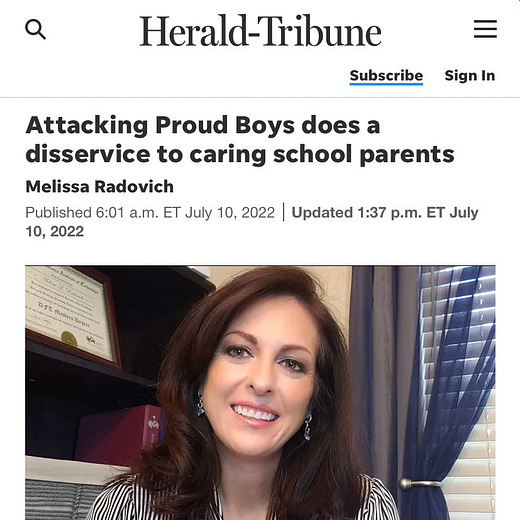It's been an extremely embarrassing week for newspaper opinion pages
From defending Proud Boys to justifying the rollback of reproductive rights, they're in lockstep with the GOP's race to the bottom.
Thanks for checking out this edition of Public Notice. After a piece about the sad state of newspaper opinion pages from Sam Thielman, scroll down to the bottom for some reflections from me on the latest Trump rally, as well as a personal note. Cheers — Aaron
Over the weekend, the Sarasota Herald-Tribune published a guest op-ed by a woman named Melissa Radovich initially titled “Don't vilify Sarasota Proud Boys for caring about their children.” The Proud Boys, a racist paramilitary group present at acts of far-right political violence from the deadly Unite the Right rally in Charlottesville to the January 6 insurrection at the Capitol, have enjoyed close connections with prominent Republicans for many years. They also apparently enjoy close connections at the 97-year-old Gannett-owned Herald-Tribune: Radovich’s husband, Nicholas Radovich, is a Proud Boy. (The article had been scrubbed from the Herald-Tribune’s website by Monday morning.)
It would be a great relief to say that the Florida-based Herald-Tribune is an isolated malefactor in its abuse of its opinion pages to run cover for violent far-right extremism, but in fact it is merely following the lead set by the Washington Post, Politico, and the New York Times, among many others. The trend seems to be part of a growing sense in American political media that, because the hard right is ascendant, it has become necessary not just to understand their perspective but to broadcast it in a show of good faith so that these publications can remain part of the national conversation, even as the nation itself tips into the sea.
It is one thing to run opinion pieces and hire columnists who contend that our national problems can be solved with lower taxes, deregulation, and strong public morals. It is quite another to announce that those morals necessitate the persecution of disenfranchised minority groups, the establishment of public religion, and the end of the right to privacy.
Opinion pages triangulate against our politics of despair
Karen Tumulty, the deputy editor of the Post’s opinion page, devoted her most recent column to praising Glenn Youngkin, whose first official act as governor was to sign an executive order banning schools from teaching critical race theory and whose latest antics include proposing a 15-week abortion ban in the wake of the Supreme Court’s destruction of Roe v. Wade. The Times’s Pamela Paul bemoaned the entirely invented but nevertheless terrifying prohibition on the word “woman,” comparing trans-inclusive language to the end of Roe. The next day, the Times published a guest essay by an anti-abortion writer explaining that her own abortion had been perfectly moral; it added to columnist Ross Douthat’s celebration of the end of Roe, a column on fetal personhood by a conservative lawyer, and a bizarre piece by yet another pro-lifer playing distasteful games with maternal mortality statistics. Politico ran a lengthy piece by a Republican operative on the premise that Tucker Carlson might be a good candidate for president.
Public Notice is a reader-supported publication. The best way to make this work sustainable is with a paid subscription (but free ones are appreciated too).
Tumulty got closest to the truth.
“Someone must test the proposition,” she wrote, “that there are still enough sane Republicans out there to create a path to the nomination for a candidate who offers himself as an alternative, rather than an amplification, of the worst aspects of Trumpism.”
The question, of course, is what exactly the worst aspects of Trumpism are. Are they his persistent and unique vulgarity? It is, admittedly, embarrassing to remember he gave a rambling speech about going to an orgy on a yacht at the 2017 Boy Scout Jamboree and responded to families who brought him pictures of their murdered loved ones by autographing them.
Trump’s also a notorious scam artist and personally violent — the number of women who swore under oath that he personally mistreated and even raped them is horrifying to contemplate.
But far more people are affected, and to a far greater degree, by the four years Trump spent dismantling the State Department, amping up the drone war, persecuting trans people, confining immigrant babies to concentration camps, and handing out lifetime appointments across the judiciary to inept ideologues, including three Supreme Court justices. It’s hard to imagine Youngkin would have done any of these things differently.
For news outlets seeking to triangulate against our new national politics of despair, Trumpism’s worst aspects are its unique aspects. They are Trump’s departures from the status quo; the moments when he said or did something so viscerally repulsive that it was hard to look at his face. But those acts merely sped up the progress of a Republican Party that leans more and more heavily on the politics of dividing and conquering and has already spent decades demagoguing sexual minorities, race, and misogyny. Republicans clearly wanted to punish women who have abortions; Trump was merely the first to say so explicitly, and when he did, he made everyone who wouldn’t look reasonable by comparison.
If you would write a law to punish women and were so ashamed you wanted to call it something else, you were suddenly better than Trump.
So now, in the interest of adjusting to that polluted status quo, we have this festival of disingenuousness and euphemism across opinion pages in our national media. We have to consider the feelings of anti-abortion agitators even as they propose bounties on people who seek abortions, and to walk on eggshells around the school board in case they learn that our kid checked a copy of a verboten graphic novel out of the library.
It is arguably correct to say that Trumpism set us on our current course. To help our leaders maintain that course, especially in the name of telling the truth, is absolute madness.







